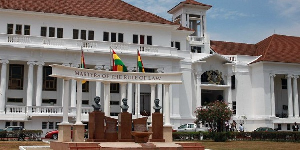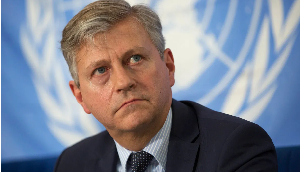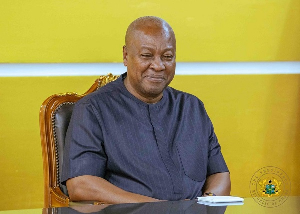Business News of Wednesday, 1 July 2015
Source: B&FT
Govt to terminate BoG management fees
The deputy Minister of Finance, Cassiel Ato Baah Forson has disclosed that government intends to stop the payment of management fees to Bank of Ghana (BoG) for the management of the Ghana Petroleum Funds.
The government is thus backing a clause in the Petroleum Revenue Management (Amendment) Bill, 2015 (PRMA), which is before Parliament, to ensure that the provision granting BoG the management role is deleted from the new Act.
The Petroleum Account is held and managed by BoG and transfers to the budget, under request of the Finance Ministry. The Act also mandates BoG to implement the investment policy that the minister determines.
One of the provisions in the Act stipulates that government is required to settle management fees to the central bank for management of Petroleum funds.
However, government is rethinking its position regarding the payment of management fees to the central bank.
Deputy Finance Minister, Ato Forson in explaining the rationale of the decision said: “The Bank of Ghana is a government agency and it is working for government; we felt that we should not necessarily pay for the services of BoG. If we continue to do that, other sectors will also demand the same and this will mean the entire petroleum revenue will go away. That is why we felt we should delete those fees,” he told B&FT.
The Petroleum Holding Fund (PHF) and the Ghana Petroleum Funds (GPFs) were established by the Petroleum Revenue ManagementAct (2011) (Act 815) (PRMA). The Act stipulates that the Bank of Ghana reports on the performance and activities of the PHF and GPF.
According to him, wide consultations with other stakeholders on the operational challenges recommended a review of the PRMA to correct inconsistencies in the Act.
“It has never been a threat but you normally review an Act to look at the future and things that will bring undue concern; in the sense that if we you are paying BoG for work done, then the Attorney-General’s department will also demand some form of payment; another department will demand money for service.
When it happens like that you will end up depleting the entire money and what you wanted to use it for will be neglected. So we felt that going forward let’s take BoG out, and if we engage anybody other than a government agency then we pay those ones,” he added.
The Act also states that the Finance Minister shall ensure the BoG transfers to the national oil company the relevant portion of petroleum revenue not later than three working days after the receipt of petroleum revenue into the Petroleum Holding Fund.
Ato Forson also pointed out that under the principal enactment the country only saves into the Petroleum Fund after excess.
“What this amendment seeks to do with the Petroleum Fund is establish that if there is excess you pay into the stabilisation fund and heritage fund, and also to make sure that whether there is excess or not you pay; it is better for the country to ensure that we have to save.
“We want to ensure a constant flow of 30% into the petroleum revenue whether there is excess or not. If we are able to come out with the amendment on time we will be able to save, and that is why we seek to correct and ensure we can be able to save regardless of the situation”
The country is estimated to have accrued during the first six months of 2014 an amount of US$562.48million which was paid into the PHF. Of this amount US$410.44million was proceeds of the four liftings undertaken by the Ghana National Petroleum Corporation.
The additional US$152.04million was in respect of corporate income tax, royalties and surface rentals.
Distributions made in the half -year amounted to US$458.23, leaving an undistributed balance of US$104.26million.












